#from the consequences of their own poor foresight
Text
So there i was: playing bg3 last night, streaming for my sibling who's just starting to play their own run. Thought I'd show off some higher level shenanigans with my party of Naven/Tav, Astarion, Shadowheart, and Lae'zel.
Spot 3 goblins having a private drinking party and go okay, ill just have Naven as the warlock with ranged spells and Astarion with sneak attack creep close and pick them off real quick. Tell my sibling to watch cause sniping baddies is fun.
Wrong.
Suddenly, my high dex characters decide they can't hide for shit. Combat begins, and takes like 12 rounds because ig i severely underestimated these 3 goblins. 5 rounds in, both Naven and Astarion are down, next round Naven is dead.
Shadowheart and Lae'zel swoop in like the queens they are and save the boys' stupid asses, roasty toasty goblins, and combat ends with Astarion down for a 2nd time and not a single successful hide despite the camp being cluttered with cover.
After one scroll of revivify, the party is back on the road and I'm cackling imagining these men trying to brush that unequivocal failure of a stealth attack off like nothing happened. Naven takes the lead again.
And I proceed to accidentally walk through a tunnel full of landmines (with the conveniently delayed passive perception warnings from the boys coming only after everyone has taken damage), Naven goes down again, and then we attempt to escape over a tree bridge, off of which both men plummet immediately.
I love these goons. I love this game.
#at this point i headcanon shadowheart as the honorary big sister of the group#she is constantly exasperated#astarion is already an instigator#but now they enable each other#and then they need to be rescued#from the consequences of their own poor foresight#bg3#baldur's gate 3#naven x astarion#tav x astarion#drow warlock#astarion#shadowheart#lae'zel#party shenanigans#poetry in motion
91 notes
·
View notes
Text
One of the things that I really like in GO is that good/bad is not indicative of right/wrong.
Warning: Good Omens Season 1 and 2 spoilers ahead, do not read if you don’t want spoilers. I'll be briefly discussing the Resurrectionist mini-episode.
Aziraphale thinks it is because he’s an angel he does good, but it’s shown in GO universe that angels can objectively do evil and wrong actions. Aziraphale disagrees when angels do what he considers evil/bad things because he knows it is not what is right. But Aziraphale has to unlearn that doing a good thing does not mean it is right, and vice versa, doing something that might have bad or what could be considered evil intent or consequences does not mean it is the wrong choice.
The Eden scene is the very clear example of this concept.
Eden - God banishes humans with no means of protection or defence. If Aziraphale had not given away his sword to Adam, what would have happened when they encountered the lion? Adam may still have won the fight, but could have been badly injured or worse, Adam could have perished.
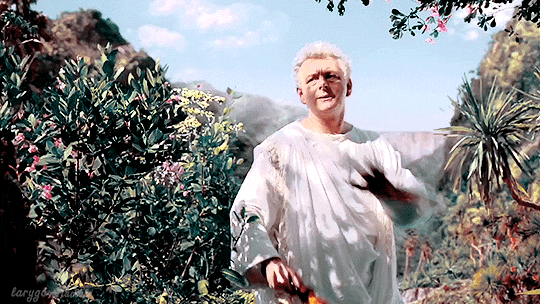
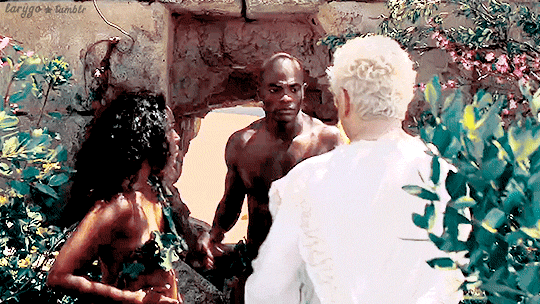
It’s only from Aziraphale’s “bad” action of defying God that he did the right thing of helping to save humans. But in the act of doing something he thought was good (trying to help humans), he introduces violence to humans and to the world. His sword is what War will wield at the end of everything. But it is still the right choice to make, as it gives humans a chance to live. The decision can be viewed simultaneously as good and evil, but the choice is still right.
The discussion between Aziraphale and Crowley on the wall epitomises this further; their actions were simultaneously good and evil, but Aziraphale worries if he did the wrong thing (in terms of a right/wrong dichotomy). Crowley's response is that as an angel he can't do the wrong thing but twists the words again in the continued discussion to joke about if maybe one did the good thing and the other the bad thing.
Both of them are showing they think 'angel = good = right' and 'demon = bad = wrong', but the whole point here is that both Crowley and Aziraphale did the right thing, and their actions can be viewed as good or bad depending on your perspective.
Supporting scenes (I did write a longer analysis for these scenes but I’ve done a summary below as this post was already getting too long)
Flood/Job episodes - Killing all living things in a certain area/punishing a good man who has done nothing wrong is objectively a bad thing but both actions are sanctioned by Heaven and is the will of God (supposedly). With the Flood, it is clear Aziraphale is upset about what is happening but does not intervene, trying to align himself with the “good” side. Deep down he knows it is wrong. But following this event, he has learnt the lesson (at least on some level) so with Job, he now does the bad/evil thing of deceiving the other angels, lying and being part of a manipulation tactic to defy God’s (apparent) plan, but in doing so he is standing by what he personally believes is right.
Armageddon - Killing all living things is again objectively a bad thing but Heaven wants a war, so after some convincing, Aziraphale again descends into doing bad actions (lying, deception, manipulation) in order to achieve the right thing in his own moral compass.
Crowley consistently does the “right” thing by leaving humans generally alone. He takes credit for their worse actions, but mostly to get Hell off his back. In reality, Crowley recognises that humans do not need demonic intervention to commit evil acts. If Crowley was actually trying to be a proper devil/demon, he should be inspiring higher levels of evil. But instead, he doesn’t encourage anything, he just commits to mildly annoying acts (although they end up coming back to bite him, but that is more from poor foresight on his part rather than actual intent in my opinion). This is the right thing in terms of humanity.
Crowley denies that he is doing something nice or good. He is right, it’s not considered a good thing to sit back and do nothing in this context, but it is the right thing for someone that goes along with Hell as far as he can go. It just so happens most of the time, he doesn’t go along with Hell at all. Just because someone is not tied to a Heavenly nature, it doesn’t mean you can’t do the right thing.
The Resurrectionist mini-episode is a massive neon light around this idea. Aziraphale is trying to do the “good” thing of absolving Elspeth of gravedigging by ruining the corpse. But in doing the “good” thing, trying to save her soul, it causes the death of Morag.
Morag would not have been in that graveyard if not for Aziraphale’s actions. Her death is the result of Aziraphale’s desire to do “good”. He might not have intended it to end that way, but if he had not intervened, she would have lived (at least, not been shot in the graveyard), Elspeth wouldn’t have tried to poison herself and it’s only from Crowley’s intervention that a second life isn’t lost that night.
So what would be the right thing in that situation? Crowley vehemently denies he is doing anything nice or good, since he is high on poison, and again it could be partly due to the “not wanting to be seen to be nice”. But I personally think it’s also a play at sometimes doing the right thing means you do someone bad or what could be considered evil.
You give a weapon to someone so they can live, causing violence and death around them to do so.
You sell corpses to a doctor, in order for him to teach people who can one day maybe save a life.
You deceive, manipulate and effectively try to brainwash the anti-Christ to believe and behave in a certain way (be neither good nor evil) in order to save the world.
Doing what is right is not determined by if it is good or evil action/intent.
Crowley doesn’t want to change Heaven, he doesn’t want to be part of fixing the problem as he probably feels it is not his problem for him to fix. He will go out of his way to fix problems Aziraphale get himself into/causes, but he’s not going to do it for a corrupt system that damned him.
Aziraphale is a selfless person, not because he is an angel, but because of who he is as an individual. I think Aziraphale does know Heaven is rotten to its core, but if Aziraphale isn’t going to help to try and make it right, who will?
It might be an evil/bad decision to go back to Heaven, but it is the right thing to keep trying, not just for himself, but for Earth which he cares for. For Crowley, so he can be safe and not threatened by Heaven ever again. For the angels like Muriel who are still in the system.
Summary: The belief that being an angel = being good = being right is incorrect, GO’s story is showing that what is right, what is good and what being an angel means are unrelated
#good omens#good omens meta#good omens spoilers#good omens season 2#go2 spoilers#crowley and aziraphale#ineffable husbands#good omens season 2 spoilers#good omens s2 spoilers#gos2 spoilers#gos2
42 notes
·
View notes
Text
The Times Women Don’t Know Their Hearts
I was thinking about my proposal analysis and it occured to me that there are two instances in Jane Austen’s novels where women don’t know how to respond to a proposal, and in both, cases, the problem is actually the influence of other women.
Emma has already been trying to turn Harriet off the Martins and on to “real gentlemen” by the time Harriet gets the proposal from Robert Martin. She ends up not knowing her own mind:
She [Harriet] was so surprized she did not know what to do. Yes, quite a proposal of marriage; and a very good letter, at least she thought so. And he wrote as if he really loved her very much—but she did not know—and so, she was come as fast as she could to ask Miss Woodhouse what she should do.—” Emma was half-ashamed of her friend for seeming so pleased and so doubtful.
Emma then clearly influences Harriet’s decision and it is implied that she also supplies her with the words of refusal. (One high point of Emma 1972 is that she actually begins to dictate Harriet’s response). So Harriet’s inability to know her own heart was Emma’s doing. It’s pretty clear by the end that if Harriet had not been led astray by Emma, she’d have accepted.
We also have Janet Ross in Mansfield Park (a friend of Mary’s):
Poor Janet has been sadly taken in, and yet there was nothing improper on her side: she did not run into the match inconsiderately; there was no want of foresight. She took three days to consider of his proposals, and during those three days asked the advice of everybody connected with her whose opinion was worth having, and especially applied to my late dear aunt, whose knowledge of the world made her judgment very generally and deservedly looked up to by all the young people of her acquaintance, and she was decidedly in favour of Mr. Fraser.
From Mary’s overall behaviour (the wish to marry for wealth and consequence), we can infer that the late Mrs. Crawford said from Mary’s words: “We were all delighted. She could not do otherwise than accept him, for he was rich, and she had nothing” What Mary doesn’t seem to grasp is that Janet must have known on some level before accepting the proposal that she wouldn’t have been happy with Mr. Fraser. Yet, she is able to be influenced and all her friends assured her it was a good idea so she went for it.
And then we have Anne Elliot, who does accept Wentworth’s first proposal, but then on the advice of Lady Russell (we know that Sir Walter didn’t have a huge hand in this), was convinced to break it off. This decision is a little trickier because in all honesty, I think Lady Russell was giving good advice. Like, maybe don’t marry a penniless sailor at 19, you might be a widowed mother in the next year... but it is ultimately a decision that Anne regrets. In hindsight, we know she would have been happier if she married him.
I also want to mention Maria Bertram, who raised by aunt Norris, has been taught to value wealth above her own happiness. We are not directly told that Mrs. Norris influenced the match, but she was instructed by Sir Thomas to conceal the engagement until he returned and then did the opposite, making it harder for Maria to call it off the marriage if that was her preference.
The only man who influences a marriage decision is Mr. Brandon Sr., who locks Eliza Brandon away until she agrees to marry his eldest son (Colonel Brandon's older brother). Jane Austen never really shows a heroine father manipulate their daughter/ward so directly, forcefully, and obviously. The closest is Sir Thomas with Fanny but even he isn't ruthless. The bigger danger for women in these novels is much more subtle influence.
I feel like the overall message here is that you need to be careful who you let influence your decisions. Or who you befriend. Anne is able to reject her father’s disapprobation, but she has more trouble with her mother figure. She forgets, perhaps, that Lady Russell is also a little too conscious of rank. Harriet and Janet both have friends who lead them down the wrong path. Fortunately Harriet gets back on track, but Janet ends up in a very unhappy marriage.
And the worst part is, all of these influencers, Emma, Mrs. Crawford, and Lady Russell (and even Mrs. Norris), think they are doing the best thing for their friend. They cannot see their own folly.
#emma does learn in the end#emma#mansfield park#jane austen#mary crawford#harriet smith#janet ross#persuasion#lady russell#anne elliot#emma woodhouse#and so does Lady Russell#not knowing their own hearts#mrs. Norris#is the worst#and Maria is her pupil
68 notes
·
View notes
Note
I feel like I'm always portrayed as a hater because it's much harder to find the "proof" online as of now (if he was more popular/cared for than we'd have it - not a jab honest) but as someone who's WAS a Ryan Guzman fan early on and had a "crush" on him, who followed his career from the beginning... that man does NOT like women (and not in the non sexual meaning 😅) I mean, he doesn't respect females as equals, and if they don't fit his mold or aren't useful to him ✌🏾. He likes a certain type of woman. They're props to him and treated them as such.
We could go into the more well known PR/cheating stunt or the racist "ghetto... comeback Eddie needs a wife" comment, or the very public toxicity of the entire relationship with Chrysti Ane - not saying she was a saint because I'm not delusional - defending, praising, and portraying her as the perfect "wife"/fiance/girlfriend/mother, crypticly dissing her multiple times simultaneously, then going back to smiles for the kids (camera) like neither were saying or doing sketchy things... but what's the point?
He's troubled, and "no one" cares because all he has to do is smile, look pretty, and tell a sob story for sympathy for people to forgive him and look away. As if some of his difficulties weren't of his own doing (and no, I'm not talking about his SI)
He should not be on the pedestal that he's on right now. I'm glad I took the rose tinted glasses of years ago. Sometimes, it's very telling which (diehard) fans just don't care about the racist/sexism/misogyny, which fans are unaware of his persona, and those who acknowledge it and choose to "separate the character from the actor."
He hasn't changed regardless of past consequences. That's just who he is.
And very personal opinion ~ He doesn't care about certain "things" as he portrays, and he only does it so people like him and to get in a "good light." Timing was always telling of that. Actions and words speak loud and clear. Especially when there's no actual effort outside of a camera. He's only ever cheering when he wants/needs some likes. He's getting what HE wants/needs regardless because it benefits HIM and HIS agenda, and yet people will continue to say "poor Ryan" when the facade goes away because he set himself up as a victim.
the more digging i do on him the more i find myself agreeing with you ! thanks a lot for this bc i do think ur right tbh
ik i'll get a lot of backlash for this from the 911 fandom i just hope we'll have the foresight to not shut down and attack any debate about him bc i think these types of conversations are important in fandom spaces
like, i used to love ryan too (and i found eddie like so hot) but after i learned abt the discourse abt him in the past i just couldn't bring myself to think abt him like that any more
anyway yeah i hope the fandom will actually be mature abt this for once and not attack me for bringing this up. like of course it's okay to like or not like an actor but i think in this case it goes beyond personal opinion
#like obviously im not gonna actively hate on him#im just saying i WILL hold him accountable#911 discourse#anti ryan guzman#911 abc#let the hate anons roll in i guess ☠️☠️
2 notes
·
View notes
Text
The Interior Of Despair
Volume 1: Fantine; Book 2: The Fall; Chapter 7: The Interior Of Despair
Let us try to say it.
It is necessary that society should look at these things, because it is itself which creates them.
He was, as we have said, an ignorant man, but he was not a fool. The light of nature was ignited in him. Unhappiness, which also possesses a clearness of vision of its own, augmented the small amount of daylight which existed in this mind. Beneath the cudgel, beneath the chain, in the cell, in hardship, beneath the burning sun of the galleys, upon the plank bed of the convict, he withdrew into his own consciousness and meditated.
He constituted himself the tribunal.
He began by putting himself on trial.
He recognized the fact that he was not an innocent man unjustly punished. He admitted that he had committed an extreme and blameworthy act; that that loaf of bread would probably not have been refused to him had he asked for it; that, in any case, it would have been better to wait until he could get it through compassion or through work; that it is not an unanswerable argument to say, “Can one wait when one is hungry?” That, in the first place, it is very rare for any one to die of hunger, literally; and next, that, fortunately or unfortunately, man is so constituted that he can suffer long and much, both morally and physically, without dying; that it is therefore necessary to have patience; that that would even have been better for those poor little children; that it had been an act of madness for him, a miserable, unfortunate wretch, to take society at large violently by the collar, and to imagine that one can escape from misery through theft; that that is in any case a poor door through which to escape from misery through which infamy enters; in short, that he was in the wrong.
Then he asked himself:—
Whether he had been the only one in fault in his fatal history. Whether it was not a serious thing, that he, a laborer, out of work, that he, an industrious man, should have lacked bread. And whether, the fault once committed and confessed, the chastisement had not been ferocious and disproportioned. Whether there had not been more abuse on the part of the law, in respect to the penalty, than there had been on the part of the culprit in respect to his fault. Whether there had not been an excess of weights in one balance of the scale, in the one which contains expiation. Whether the over-weight of the penalty was not equivalent to the annihilation of the crime, and did not result in reversing the situation, of replacing the fault of the delinquent by the fault of the repression, of converting the guilty man into the victim, and the debtor into the creditor, and of ranging the law definitely on the side of the man who had violated it.
Whether this penalty, complicated by successive aggravations for attempts at escape, had not ended in becoming a sort of outrage perpetrated by the stronger upon the feebler, a crime of society against the individual, a crime which was being committed afresh every day, a crime which had lasted nineteen years.
He asked himself whether human society could have the right to force its members to suffer equally in one case for its own unreasonable lack of foresight, and in the other case for its pitiless foresight; and to seize a poor man forever between a defect and an excess, a default of work and an excess of punishment.
Whether it was not outrageous for society to treat thus precisely those of its members who were the least well endowed in the division of goods made by chance, and consequently the most deserving of consideration.
These questions put and answered, he judged society and condemned it.
He condemned it to his hatred.
He made it responsible for the fate which he was suffering, and he said to himself that it might be that one day he should not hesitate to call it to account. He declared to himself that there was no equilibrium between the harm which he had caused and the harm which was being done to him; he finally arrived at the conclusion that his punishment was not, in truth, unjust, but that it most assuredly was iniquitous.
Anger may be both foolish and absurd; one can be irritated wrongfully; one is exasperated only when there is some show of right on one’s side at bottom. Jean Valjean felt himself exasperated.
And besides, human society had done him nothing but harm; he had never seen anything of it save that angry face which it calls Justice, and which it shows to those whom it strikes. Men had only touched him to bruise him. Every contact with them had been a blow. Never, since his infancy, since the days of his mother, of his sister, had he ever encountered a friendly word and a kindly glance. From suffering to suffering, he had gradually arrived at the conviction that life is a war; and that in this war he was the conquered. He had no other weapon than his hate. He resolved to whet it in the galleys and to bear it away with him when he departed.
There was at Toulon a school for the convicts, kept by the Ignorantin friars, where the most necessary branches were taught to those of the unfortunate men who had a mind for them. He was of the number who had a mind. He went to school at the age of forty, and learned to read, to write, to cipher. He felt that to fortify his intelligence was to fortify his hate. In certain cases, education and enlightenment can serve to eke out evil.
This is a sad thing to say; after having judged society, which had caused his unhappiness, he judged Providence, which had made society, and he condemned it also.
Thus during nineteen years of torture and slavery, this soul mounted and at the same time fell. Light entered it on one side, and darkness on the other.
Jean Valjean had not, as we have seen, an evil nature. He was still good when he arrived at the galleys. He there condemned society, and felt that he was becoming wicked; he there condemned Providence, and was conscious that he was becoming impious.
It is difficult not to indulge in meditation at this point.
Does human nature thus change utterly and from top to bottom? Can the man created good by God be rendered wicked by man? Can the soul be completely made over by fate, and become evil, fate being evil? Can the heart become misshapen and contract incurable deformities and infirmities under the oppression of a disproportionate unhappiness, as the vertebral column beneath too low a vault? Is there not in every human soul, was there not in the soul of Jean Valjean in particular, a first spark, a divine element, incorruptible in this world, immortal in the other, which good can develop, fan, ignite, and make to glow with splendor, and which evil can never wholly extinguish?
Grave and obscure questions, to the last of which every physiologist would probably have responded no, and that without hesitation, had he beheld at Toulon, during the hours of repose, which were for Jean Valjean hours of reverie, this gloomy galley-slave, seated with folded arms upon the bar of some capstan, with the end of his chain thrust into his pocket to prevent its dragging, serious, silent, and thoughtful, a pariah of the laws which regarded the man with wrath, condemned by civilization, and regarding heaven with severity.
Certainly,—and we make no attempt to dissimulate the fact,—the observing physiologist would have beheld an irremediable misery; he would, perchance, have pitied this sick man, of the law’s making; but he would not have even essayed any treatment; he would have turned aside his gaze from the caverns of which he would have caught a glimpse within this soul, and, like Dante at the portals of hell, he would have effaced from this existence the word which the finger of God has, nevertheless, inscribed upon the brow of every man,—hope.
Was this state of his soul, which we have attempted to analyze, as perfectly clear to Jean Valjean as we have tried to render it for those who read us? Did Jean Valjean distinctly perceive, after their formation, and had he seen distinctly during the process of their formation, all the elements of which his moral misery was composed? Had this rough and unlettered man gathered a perfectly clear perception of the succession of ideas through which he had, by degrees, mounted and descended to the lugubrious aspects which had, for so many years, formed the inner horizon of his spirit? Was he conscious of all that passed within him, and of all that was working there? That is something which we do not presume to state; it is something which we do not even believe. There was too much ignorance in Jean Valjean, even after his misfortune, to prevent much vagueness from still lingering there. At times he did not rightly know himself what he felt. Jean Valjean was in the shadows; he suffered in the shadows; he hated in the shadows; one might have said that he hated in advance of himself. He dwelt habitually in this shadow, feeling his way like a blind man and a dreamer. Only, at intervals, there suddenly came to him, from without and from within, an access of wrath, a surcharge of suffering, a livid and rapid flash which illuminated his whole soul, and caused to appear abruptly all around him, in front, behind, amid the gleams of a frightful light, the hideous precipices and the sombre perspective of his destiny.
The flash passed, the night closed in again; and where was he? He no longer knew. The peculiarity of pains of this nature, in which that which is pitiless—that is to say, that which is brutalizing—predominates, is to transform a man, little by little, by a sort of stupid transfiguration, into a wild beast; sometimes into a ferocious beast.
Jean Valjean’s successive and obstinate attempts at escape would alone suffice to prove this strange working of the law upon the human soul. Jean Valjean would have renewed these attempts, utterly useless and foolish as they were, as often as the opportunity had presented itself, without reflecting for an instant on the result, nor on the experiences which he had already gone through. He escaped impetuously, like the wolf who finds his cage open. Instinct said to him, “Flee!” Reason would have said, “Remain!” But in the presence of so violent a temptation, reason vanished; nothing remained but instinct. The beast alone acted. When he was recaptured, the fresh severities inflicted on him only served to render him still more wild.
One detail, which we must not omit, is that he possessed a physical strength which was not approached by a single one of the denizens of the galleys. At work, at paying out a cable or winding up a capstan, Jean Valjean was worth four men. He sometimes lifted and sustained enormous weights on his back; and when the occasion demanded it, he replaced that implement which is called a jack-screw, and was formerly called orgueil [pride], whence, we may remark in passing, is derived the name of the Rue Montorgueil, near the Halles [Fishmarket] in Paris. His comrades had nicknamed him Jean the Jack-screw. Once, when they were repairing the balcony of the town-hall at Toulon, one of those admirable caryatids of Puget, which support the balcony, became loosened, and was on the point of falling. Jean Valjean, who was present, supported the caryatid with his shoulder, and gave the workmen time to arrive.
His suppleness even exceeded his strength. Certain convicts who were forever dreaming of escape, ended by making a veritable science of force and skill combined. It is the science of muscles. An entire system of mysterious statics is daily practised by prisoners, men who are forever envious of the flies and birds. To climb a vertical surface, and to find points of support where hardly a projection was visible, was play to Jean Valjean. An angle of the wall being given, with the tension of his back and legs, with his elbows and his heels fitted into the unevenness of the stone, he raised himself as if by magic to the third story. He sometimes mounted thus even to the roof of the galley prison.
He spoke but little. He laughed not at all. An excessive emotion was required to wring from him, once or twice a year, that lugubrious laugh of the convict, which is like the echo of the laugh of a demon. To all appearance, he seemed to be occupied in the constant contemplation of something terrible.
He was absorbed, in fact.
Athwart the unhealthy perceptions of an incomplete nature and a crushed intelligence, he was confusedly conscious that some monstrous thing was resting on him. In that obscure and wan shadow within which he crawled, each time that he turned his neck and essayed to raise his glance, he perceived with terror, mingled with rage, a sort of frightful accumulation of things, collecting and mounting above him, beyond the range of his vision,—laws, prejudices, men, and deeds,—whose outlines escaped him, whose mass terrified him, and which was nothing else than that prodigious pyramid which we call civilization. He distinguished, here and there in that swarming and formless mass, now near him, now afar off and on inaccessible table-lands, some group, some detail, vividly illuminated; here the galley-sergeant and his cudgel; there the gendarme and his sword; yonder the mitred archbishop; away at the top, like a sort of sun, the Emperor, crowned and dazzling. It seemed to him that these distant splendors, far from dissipating his night, rendered it more funereal and more black. All this—laws, prejudices, deeds, men, things—went and came above him, over his head, in accordance with the complicated and mysterious movement which God imparts to civilization, walking over him and crushing him with I know not what peacefulness in its cruelty and inexorability in its indifference. Souls which have fallen to the bottom of all possible misfortune, unhappy men lost in the lowest of those limbos at which no one any longer looks, the reproved of the law, feel the whole weight of this human society, so formidable for him who is without, so frightful for him who is beneath, resting upon their heads.
In this situation Jean Valjean meditated; and what could be the nature of his meditation?
If the grain of millet beneath the millstone had thoughts, it would, doubtless, think that same thing which Jean Valjean thought.
All these things, realities full of spectres, phantasmagories full of realities, had eventually created for him a sort of interior state which is almost indescribable.
At times, amid his convict toil, he paused. He fell to thinking. His reason, at one and the same time riper and more troubled than of yore, rose in revolt. Everything which had happened to him seemed to him absurd; everything that surrounded him seemed to him impossible. He said to himself, “It is a dream.” He gazed at the galley-sergeant standing a few paces from him; the galley-sergeant seemed a phantom to him. All of a sudden the phantom dealt him a blow with his cudgel.
Visible nature hardly existed for him. It would almost be true to say that there existed for Jean Valjean neither sun, nor fine summer days, nor radiant sky, nor fresh April dawns. I know not what vent-hole daylight habitually illumined his soul.
To sum up, in conclusion, that which can be summed up and translated into positive results in all that we have just pointed out, we will confine ourselves to the statement that, in the course of nineteen years, Jean Valjean, the inoffensive tree-pruner of Faverolles, the formidable convict of Toulon, had become capable, thanks to the manner in which the galleys had moulded him, of two sorts of evil action: firstly, of evil action which was rapid, unpremeditated, dashing, entirely instinctive, in the nature of reprisals for the evil which he had undergone; secondly, of evil action which was serious, grave, consciously argued out and premeditated, with the false ideas which such a misfortune can furnish. His deliberate deeds passed through three successive phases, which natures of a certain stamp can alone traverse,—reasoning, will, perseverance. He had for moving causes his habitual wrath, bitterness of soul, a profound sense of indignities suffered, the reaction even against the good, the innocent, and the just, if there are any such. The point of departure, like the point of arrival, for all his thoughts, was hatred of human law; that hatred which, if it be not arrested in its development by some providential incident, becomes, within a given time, the hatred of society, then the hatred of the human race, then the hatred of creation, and which manifests itself by a vague, incessant, and brutal desire to do harm to some living being, no matter whom. It will be perceived that it was not without reason that Jean Valjean’s passport described him as a very dangerous man.
From year to year this soul had dried away slowly, but with fatal sureness. When the heart is dry, the eye is dry. On his departure from the galleys it had been nineteen years since he had shed a tear.
10 notes
·
View notes
Text

In the thin line between philosophy and reality.
The 3 keys: Objectivity and Perspective and the word "Why"
If you have lost your way and lost your energy, the proof for yourself is a lack of objectivity, perspective and a non-questioning mindset.
Then perhaps these are the 3 most important keys to understanding society's misleading rhetoric.
As in an example: in a statement there can be a chain of either a domino effect or more links.
What appears many times in a message is only the part of the link that benefits the narrator's purpose / a.g.e.n.d.a.
An important keyword is, as I said, "why" With this word, you can pull, turn and twist the chain to anticipate consequences. So also highlight bits before and after the purported link's message.
If you look at events in our society today and compare it to the history of man, it is easier to understand that man has not developed mentally that much. The m.a.k.t addiction, the allure and temptation of p.e.r.f.e.c.t.i.o.n of p.o.w.e.r sweetness doesn't seem to have abated.
In the m.a.k.t.e.n.'s intoxicating state of mind, horns can grow in a bottomless egotism.
These actions are often justified by misleading perspectives that can also go under the heading of p.r.o.p.a.g.a.n.d.a
The morals and ethics that create security, where togetherness with responsibility shines with its absence.
Lying is suddenly ok, thus a consequence follows where a distortion of reality takes place and deceives.
Without objectivity, it is easy to step into the dark labyrinths where vision loses focus from the core.
These 3 keys Objectivity and Perspective and the word "Why" go a long way to unlocking one's own mentally closed doors but also the gates to what is taking place on our mother earth.
Since most of us are good people, it is easy to believe what someone says.
Yes, you simply have a trust.
But there are many shades and layers. Those who are more immature in their souls do not always understand the consequences of their short-term actions, or simply ignore responsibility for their own gain.
It applies at all levels, rich or poor, titles or not.
Some people believe that many times they cannot understand, hence just follow the flow in the belief that everyone cannot be wrong, but without questioning.
Today, the light bearers are more important than ever as I see it before an awakening.
* Questioning is not evil.
* Being objective is about wisdom and prudence.
* Trying to see different sides of an action is trying to have foresight. The word c.o.n.s.p.i.r.a.c.y which of course is used in the governing ranks, where you turn and twist m.a.k.t questions to try to understand how to steer in the direction that one's p.o.l.i.t.i.c.i.a.n color maintains. Where the m.a.k.t.e. sadly seems to be more important than the content.
Behind the curtains of colors lies something: which works without being seen. A governing structure that possibly produces the performance.
Yes, the contours of the theater salons of the shadows are finally beginning to emerge.
more on www.magnusrosen.nu
Magnus
Make the world a better place
Love, p.e.a.c.e & Understanding
Questions give knowledge
Free s.p.e.e.c.h gives a F.r.e.e World.
Magnus Rosen - Ambassador for Green Cross
P.e.a.c.e on Mother Earth
Green-Cross www.green-cross.se
www.baibang.se
www.magnusrosenband.com
www.culturemeetsindustry.com
www.covershow.se
@followers @all @everyone #bahiarock #brazil @följare #baibang #sverigesriksdag #nyheterna
#allfollowers #avelibooks #basenimitthjärta #ebs #rotary
#magnusrosen
#magnusrosen #hardrock
#rock #rockmusic #glamrock
0 notes
Note
From UnfcrunateScn: "Are you really the best artisan in Remnant? Considering everything you make disappears as soon as you make something new? Doesn't that just make you a shitty contractor?"
random compliments hour...?
💢
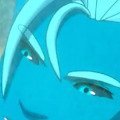
"If the tailor who makes a jacket in your size produces a bigger one once you outgrow the old one, is he a poor contractor?"
Okay, consider him quite irritated. He's heard all manner of complaints about his work, usually from those dissatisfied with the results they explicitly asked for. It's been a while since someone suggested he was a wholly underwhelming craftsman by virtue of the rules, though.
"Kid, first of all, it's a law of the natural universe: to create something new, you've got to destroy. Breaking something down into its components is the only manner in which you can use those components to build something else. Every artisan your race could ever provide would understand that."
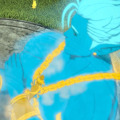
"Second--and this is especially important--if everything I made stuck around, you wouldn't be here. The purpose of that rule is two-fold: it encourages my patrons to commission within their means, so to speak. That, and it also ensures people have a pretty reasonable out from the consequences of what they create. Do you know how many people have summoned me, and made some gigantic problem for themselves and others that would've been completely insurmountable if not for the fact of a shelf life? Men have commissioned me for things that would've overrun your whole planet with water, lava, earth, or the beasts of Hell, purely because of their own lack of foresight. Be very grateful nothing I can give you is guaranteed forever."
Now, where was he? Oh, yes--
"And with all that in mind, yes, I am the best artisan you and anyone else on Remnant will ever meet. I was designed with that in mind, after all."
1 note
·
View note
Text
Watch "Reporter's Notebook: Tira-tirang pagkain o pagpag, bumubuhay sa mahihirap na pamilyang Pilipino" on YouTube
youtube
The Dangerous Consequences Of Food Waste In The Philippines.
Philippines is one of the third world countries that is currently experiencing poverty crises. Many people, especially in the urban region, have difficulties when it comes to food consumptions. Every year, the poverty rates doubles and that's what makes it difficult to reduce. And food waste in the country makes it more severe to the point that people in the low socio-economic background are forced to consume foods desperately even though they are left overs. It can obviously lead to chronic or permanent health issues.
By watching the video, I feel a little guilt thingking how all these years, I have been wasting a lot of food not being aware that there's a population somewhere experiencing food deprivation. Especially when the pandemic strikes the country. Many people were forced to leave their jobs for their health and security. But on the other hand, it's an opposite thing when it comes to their daily food consumptions.
According to statistics, thousands of sack of rice are the amount of food wasted every year. Especially veggies that are always been very important among Filipinos. This uncontrolled rate is increasing overtime. By this, it's difficult for the government to control it immediately.
People in the higher class through middle class can easily pass this issue. But as we know, poor people are the one who's going to take all of these consequences. Everyday, these individuals would tolerate certain systems in society although it would lead them to be desperate individuals. Desperate enough for a job. Desperate enough for food consumptions. Desperate enough for comfort in life.
From my own perspective, it seems like food wasting can never be eliminated. The only thing we can do as part of the society is to be mindful with the food we are consuming. Use your foresight to see what would be the consequences if you've wasted even the tiny portion of it. It is a very hard discipline indeed. This is because it feels comforting to be mindless. We are used to be mindless. But it can be trained. Mindfulness and discipline can be trained. By uniting people within the society, we can do little things that can help the country drastically.
" As a student, it's very hard to be confident with your stand and opinions. People would underestimate what we can do because they see us as some children who seems like a rebellious individual getting out from social norms. But by speaking up from our behalf, I know we can change the elders perception. We are part of this society. It's time for us to be noticed for the sake of the better future ".
- LW
0 notes
Text
Les Misérables 30/365 -Victor Hugo
21
“It is necessary that society should look at those things, because it is itself which creates them.”p.67 Valjean was ignorant but no fool, he was not innocent or unjustly punished, it was an act of madness. Then, wondered if he was the only one in history at fault, if he, a laborer, should lack bread and excess of weights on the scales of justice. Should society have a right to have members suffer equally for its own lack of foresight, a poor man between a default of work and excess of punishment. (Hugo coming early with the socio-economic crime commentary) Was it outrageous for society to treat those least endowed consequently the most deserving of consideration. He judged society and condemned it to hatred.
Society had only harmed him, not since his mother and sister had he encountered a friendly word or touch. He was educated in the galleys to fortify his hate. “In certain cases, education and enlightenment can serve to eke out evil.”p.68 After judging society he also judged Providence and condemned it too. After nineteen years darkness overtook light, though Valjean wasn’t evil in nature. Can human nature change by fate and circumstance. Those can transform a man little by little into a beast, sometimes into a ferocious one, Valjean’s escape attempts are proof and the recaptures made him wilder with his excess strength.
He was conscious of something monstrous resting on him, accumulating, laws, prejudices, deeds, in a pyramid called civilization. They were over his head crushing him and he thought of this, how everything that happened to him was absurd. Those nineteen years molded Valjean to act two evil actions of unpremeditated instinct and evil actions of premeditated seriousness. (yeah prisons don’t reform just turn troubled people into worse animals) It passed through three phases of reasoning, will and perseverance, habitual wrath and hatred of society, the human race and creation, a desire to do harm and so Valjean’s passport described him as a dangerous man. He hasn’t cried in nineteen years, his soul gradually dried away.
22
A drowning man isn't heard in a storm and in exhaustion gives up. “Oh, implacable march of human societies! Oh, losses of men and of souls on the way! Ocean into which falls all that the law let slip! Disastrous absence of help! Oh, moral death!”p.72 The soul in the waters may become a corpse, but who shall save it.
23
When Valjean heard he was being released from the galleys a light penetrated him and believed he had a chance at a new life. Then filled with bitterness as his pay was reduced and he felt robbed. He tried to find work but when people read his passport, he was underpaid and sent off. Society robbed him wholesale now he was being robbed retail. “Liberation is not deliverance. One gets free from the galleys, but not from the sentence.”p.73 (see how convicted felons aren’t allowed certain jobs and not allowed to vote)
24
Valjean woke at two and couldn’t go back to sleep so he thought and one was prevalent to the silverware. He thought of them and slowly made up his mind. He took an iron candlestick and went to the Bishop’s room, he hadn't closed his door.
25
He pushed it open wider and entered the room and went near the bed. The Bishop was asleep with a divine radiance and Valjean hesitated before stealing the silverware and flees out the window. (yeah he was about to beat him to death)
26
The next morning Myriel was in his garden and Magloire asked if he knew the silverware was missing, yes. (she asked if he’s seen the silverware basket and he was like right here in the garden) Magloire freaks over it being stolen and Myriel asks if the silver was theirs in the first place, it belonged to the poor, they’ll eat with wooden cutlery.
At breakfast Magloire spoke about how it was fortunate they were only robbed. Then there was a knock on the door as three gendarmes (an armed police officer so regular police) dragged Valjean inside. The Bishop, unfazed told Valjean he had given him the candlesticks too, why didn’t he take them and told the gendarmes it was a mistake to accost him like a thief and to release him. Myriel hands the candlesticks to Valjean and tells him when he returns to use the street door, it’s never locked. “Do not forget, never forget, that you have promised to use this money in becoming an honest man.”p.78 Valjean doesn’t remember making such a promise, Myriel says he bought his soul and gave it to God.
27
Valjean left the town, wandering all morning, prey of novel sensations, felt rage to an unknown person, was he touched or humiliated and felt the calm of his injustice leave him, what would replace it. Sitting at a bush he watched a Savoyard (a inhabitant of Savoy) come by and drop a coin that rolled up to Valjean and he demands his money back. Valjean chases him off and after realizes what he did and calls out to the boy, Gervais, but he’s long gone.
He looks around asking people if they’ve seen him but no one has. His legs eventually give way and felt overwhelmed with an evil conscience and for the first time in twenty years he cried. His struggle of conquer of be conquered was now between his viciousness and goodness of the Bishop. If he worked to be good, he must be an angel and if he remained evil, a monster.
Once leaving the galleys the Bishop hurt his soul as light would the eyes used to darkness. He wasn’t the same man, why did he rob a child, the last of the effect of the galleys. He’s horrified by Jean Valjean, the Bishop was his conscience and he cried for a long time. Daylight penetrated his soul and he examined his life, where did he go after that no one knows but that night a man was seen praying at the Bishop’s door.
BOOK THIRD IN THE YEAR 1817
28
1817 Louis XVIII was in year twenty-two of his reign when M. Bruguire was celebrated. Napoleon was at St. Helena there were still Prussians in France. The bridge of Austerlitz abdicated and entitled the bridge of King’s Garden. The Council of Ministers questioned if Franconi’s posters that attracted street urchins should be tolerated. All people agreed the era of revolution was forever closed by King Louis XVIII. (laughs in 2022)
Cardinal Fesch refused to resign, the Archbishop of Amasie administered the diocese of Lyons, Switzerland and France fought over the Valley of Dappes. A steamboat went down the Sienne as Lord Byron was making his mark. Dupuytren and Recamie fought over the divinity of Christ and Cuvier tried to connect fossils to the Great Flood. (I’m sure all this information is useful for those that lived in the region or at this time but as a 2022 American I have no idea who half these people are)
There are no trivial facts in humanity, “This is what floats up confusedly, pell-mell, for the year 1817, and is now forgotten. History neglects nearly all these particulars and cannot do otherwise; the infinity would overwhelm it.”p.87 This year four Parisians arranged a farce.
29
The four were students, insignificant, Felix, Listolier, Fameuil, and Blanchevelle and their mistresses were Favourite, Dahlia, Zephine and Fantine, who was still illusioned. The three of them were philosophical and Fantine was a good girl, a blossom from the dregs, no family name, no family. At fifteen she left her little town and went to Paris to seek her fortune. Trying to stay as pure as she could with her only gold her hair and only pearls her teeth. (pay attention the book constantly brings up her teeth and hair) She loved Felix, (c’mon Fantine he’s not even good looking) he was thirty and rich and convinced his friends to take their mistresses on a holiday.
30
Hard to believe these pleasure trips were common forty years ago. Paris is no longer the same. (pre Covid times seem like forty years ago too) These eight went out into the country, this season of a love affair, Fantine was reserved and modest. “Love is a fault; so be it. Fantine was innocence floating high overfull.”p.91
NEXT
0 notes
Text
Hi!
Lately I've been reading your blog in my spare time.
And oh heavens...I'm in love with your amazing mind!!
I hope you won't mind if I share some of my thoughts? I'm sorry if I'm being too dramatic.
I thought for a long time about all this "accumulation" of ink in the body, during Yuu's stay in NRC.
The first is that in the world of Yuu, there is no magic as such, then their body will be exposed to magic more strongly than other students.
I think it would be logical that with the appearance of the first magic stones, magic became more stable and had less influence on the "carrier" and this is what has been produced in the bodies of TWST residents for many generations. They are used to living surrounded by magic. They no longer have the "side effects" of magic like their ancestors.
But Yuu didn't have a single chance to skip this "phase", their body is trying to adapt to all this monstrous power of magic in college. (Poor Yuu was just thrown literally into the magical Chernobyl)
Add to this the fact that Yuu and Grim do not live in the best conditions.
Give them a normal home already, I beg...., I know what it's like to be in terrible conditions for a long time and I can literally see the consequences on Yuu's health. Considering that the roof is leaking, I am sure that there is mold and mildew in the building. And they definitely won't spare the lungs of a teenager who sleeps on a multi-week draught!
It's a constant cough, it's suffocation from dust and a musty smell.
Yuu's body literally cannot be at rest and safe for any length of time.
(Leona i just thanks, at least for the fact that they could sleep on the floor. Not a five-star hotel, but it's better than it was. It's still warm in Sawanaclaw.)
And something else has been bothering me for weeks.
Do you remember Director Crowley saying that Yuu has memory impairments due to teleportation magic?
And that she should recover over time?
But what if Yuu's brains were literally....Burned out by magic?
For a long time Yuu can't remember something more "concrete" about his world. Holidays are very common, some sports that can be heard by chance.
What if magic had irreversibly burned their memories of their home into Yuu's memory?
Irrevocably and cruelly.
"Magic is not omnipotent"
She will not be able to repair or restore their memory, because there is nothing left of her.
And this is the cruelest thing that can ever happen to poor Yuu.
Their body is literally soaked in toxic ink, which slowly kills them and makes them behave very harshly and rudely towards others.
Their minds are definitely out of order. (I won't even argue Yuu will have PTSD at the end of Chapter 6.)
Because they have no guarantee that their mind is clear and does not break, they do not go crazy because of everything that has happened.Yuu has no evidence that all these "dreams/visions" are not something normal in TWST.
Yes, it is possible that this is a gift of "foresight". Something like the strength of Merlin from the cartoon "Sword in Stone". He can't tell who and when. But he knows for sure that this will happen.
This can be a very rare phenomenon among magicians, which many will want to get to use to please themselves.
So they have to hide it all like in a Pandora's box. Not for anything, not to show anyone, under any circumstances, because they have been taught more than once not to show their weaknesses.
And you know I don't trust Crowley. * cough * because he is a Phantom Blot and is clearly plotting something * cough*
Why doesn't he make a Puppet for himself?Literally break up an unformed teenager - Yuu, for your own purposes?
The soaked body of a teenager without magic cannot form a "full-fledged Phantom" right?
But they also cannot die, because without a "carrier" there will be no shell necessary for the Phantom to live. ..
In any case, thank you for your attention! I wish you a good week, you're wonderful, don't forget about it!
And I am proud of all those small achievements that you manage to do!( •̀ ω •́ )✧
23 notes
·
View notes
Text
SU rewatch- S1E11- Arcade Mania
Hey, long time no see!
I’m desperately bored in solitary quarantine at university right now, and decided to try and pick this SU rewatch series up again for fun. It’s been a while since I’ve watched through the show in order. Plus, now that this show is completely finished, there’s plenty more connections to make. I can’t promise I’ll be consistent with this, but at the very least I can have fun trying to make a few more posts at my leisure.
Anyways. With that business out of the way. Let’s get right on to the show!
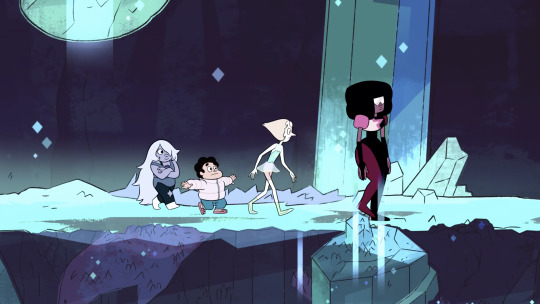
We begin with yet another mission Steven’s guardians have brought him along on! I believe this is the fifth mission we know of that he’s accompanied them on so far. (Lunar Sea Spire, Inverted Pyramid, the unknown mission he returns from in Tiger Millionaire, the desert, and now this one.) It’s really sweet seeing the Gems begin to trust him tagging along more often. There will come a day in the near future where missions become routine for Steven, but in these early episodes, you can really tell that each and every one is a brand new adventure.
In terms of plot, though, this episode is honestly Future Vision: The Prequel.
We learn a lot about Garnet’s abilities and her role in the team here, even if all of these details aren’t spelled out word-for-word quite yet. Hints towards her future vision we see this ep include:
Garnet moving ahead of the group to be in the perfect spot to catch Steven when he falls.
Her flawless moves while fighting and dodging the monsters.
Her becoming a master at the rhythm game later in the episode.
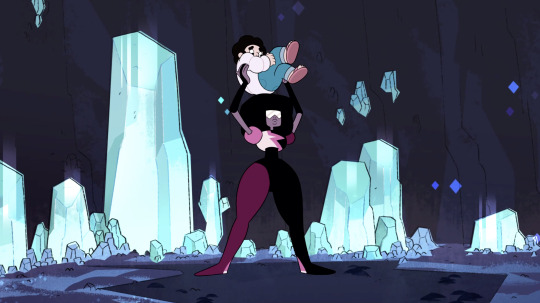
Like, damn. Look at this.
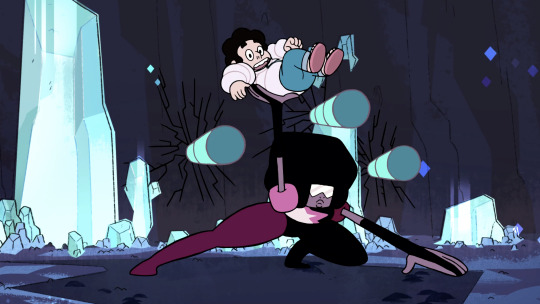
Look at her go.
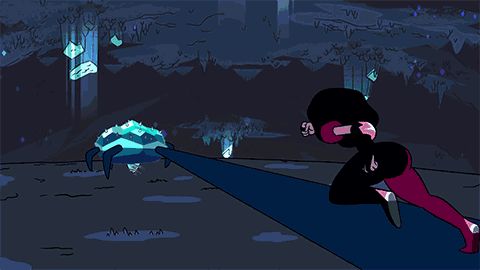
My Q U E E N!
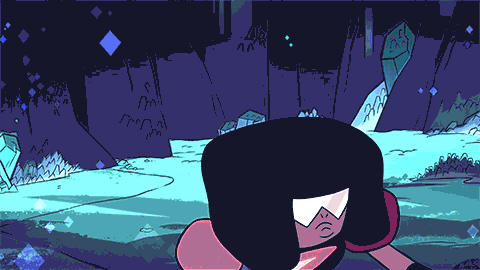
I had to gif all of this just because it’s such a beautiful and smooth sequence of animation.
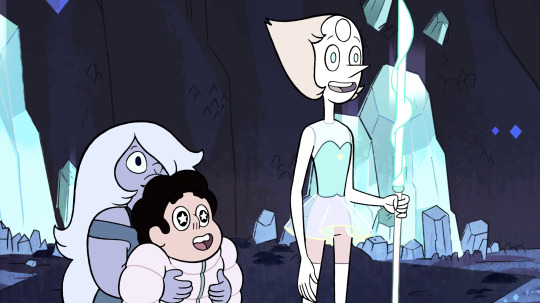
If there’s one thing all of the Crystal Gems can 100% agree on, it’s that Garnet is friggin’ amazing.
Garnet: “Let them go. They’re just parasites. If they want to be a problem, they’ll have to answer to me.”
So, does this statement mean that- at this present moment- her extended stay at the arcade was entirely beyond her future vision? That the only futures she saw were ones where she was actually present to deal with containment of the Gem parasites? Given that later scenes insinuate she’d never been to the arcade before, and would have no “data” about its games to factor into her internal understanding of the world, this seems likely.
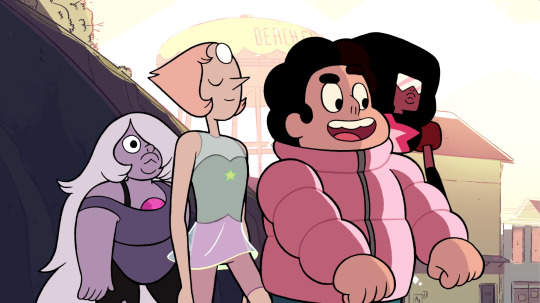
I adore the gradual palette change here, from shadow, to setting sun. It’s a nice detail that adds so much more life to what could otherwise be a rather mundane transition scene. It seems like unique palettes were more common in early SU- I wonder why Crewniverse stopped implementing these as often later on?
Pearl, entering the arcade: “Humans find such fascinating ways to waste their time.”
Thanks, Pearl. Love you too. <3
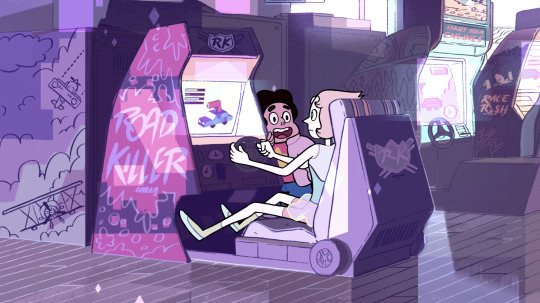
This sequence of Pearl failing at playing a car chase/road rage game hits so much different knowing what happens in Last One Out of Beach City. It’s genuinely radical how far she grows in confidence from this point, because here, she seems so shackled to rules and guidelines. Now that we know about her rebellious past, it might be tempting to write this characterization off as “early series weirdness,” but... I don’t think that’s what’s happening here.
Instead, I wonder if she’s working through grief-related regression.
Think about it... the pain of Rose’s passing is still so fresh for her. She was a rule breaking rebel once, yes, but she spent all of those days at Rose’s side. And I get the sense that she’s poured so much of herself into keeping Rose safe, into the rebellion against Homeworld, that without those, she’s caught in a vacuum. What IS her purpose now, when the very person she rebelled for is gone?
So she slips back into old pearl-like habits. Chronic rule following, and a fear of deviating from norms. How familiar. Thankfully, much of her arc throughout the show is her directly growing beyond these habits to live boldly as her own Gem.
The friggin video game when Garnet knocks its head off: “TELL MY WIFE I’M SORRYYY!!!”
Yo, what the fuck. This line is both hilarious and messed up, all at once. Please tell me the game isn’t sentient.
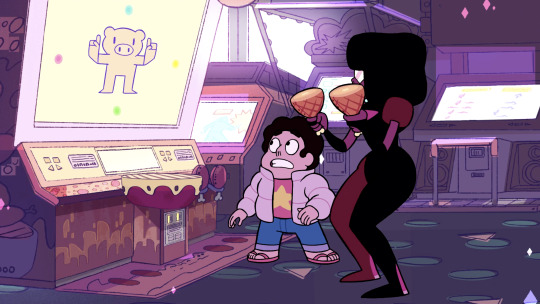
Aaaand here we finally introduce Garnet to the video game sensation that is Meat Beat Mania! This game is perfectly suited to her and her power of foresight because its patterns are algorithmic and not vulnerable to spontaneous deviations, and thus easy to predict, with enough input. She’s probably getting a quick rush of satisfaction with every correct move, and she barely has to exert any energy with her future vision to get that rush. After years and years of wading through endless possibility at every avenue, this video game’s patterns must be a rejuvenating breath of fresh air.
It’s addicting.
...Kinda makes me think of how I get sometimes when I play solitaire on my phone for an hour straight. After a while, I barely even think, I’m just shuffling through my deck and moving cards almost on automatic. I don’t have to use much energy to play, and it gives me animated fireworks every time I finish a match. It’s a win-win.
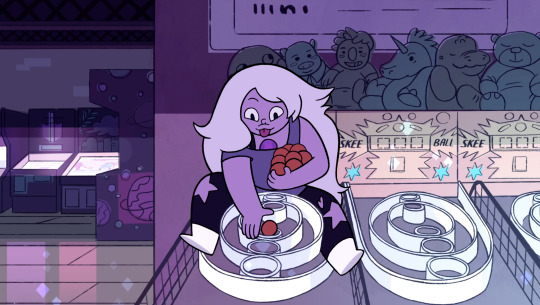
Amethyst: “I’MMA WIN AN AIRPLANE!”
I don’t know what it is about the way Michaela Dietz says the world “airplane,” but this makes me laugh every time. Does... does she think she can win a genuine airplane here because she saw Onion win a tiny motorbike from the ticket booth?? Amethyst, oh my god. XD
She’s got the spirit, this wild child.
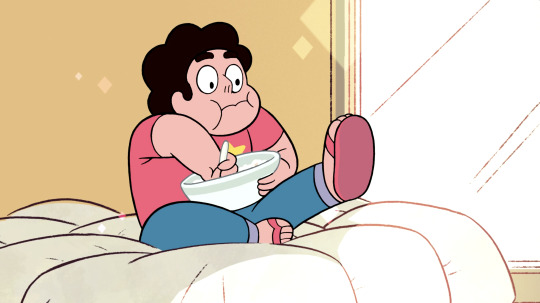
So, moving on- we meet up with our crew later the next morning, Garnet nowhere to be seen. There’s an interesting exchange I’d like to highlight real quick-
Pearl: “If we’re supposed to fight a giant foot, Garnet would let us know.”
Amethyst: “Yeah, Garnet’s the boss!”
Pearl: “Well, we’re all a team. Garnet just has heightened perception that guides us towards our mission objectives.”
Considering the specific phrasing Pearl uses here- “heightened perception” instead of “future vision-” did Garnet outright tell the two of them to not explain her powers, just like she told them not to mention she’s a fusion? Because I’m pretty sure no one ever uses the phrase “heightened perception” again in reference to her powers.
Given the fact that Garnet chose to keep the knowledge of Ruby and Sapphire under the table until she felt Steven could understand her better, my guess is that this is a similar scenario.
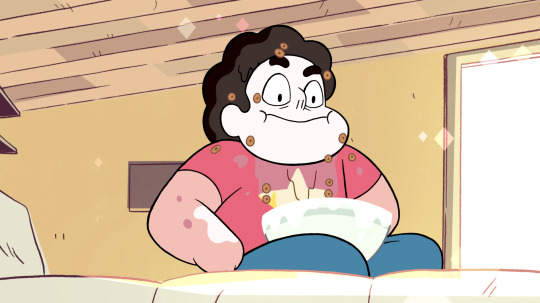
Ahah, I genuinely can’t tell if this is Steven being gullible, or just impulsively playing along with Amethyst’s antics. Still- gross, kid. Don’t wipe your wet cereal face on your shirt! Ew! :O
When he goes outside and starts to use a kiddy metal detector to scan for quarters... so THAT’S where he finds his arcade money! Because I can’t imagine Greg is financially able to give him that much to spend on non-essentials at this point in the show.
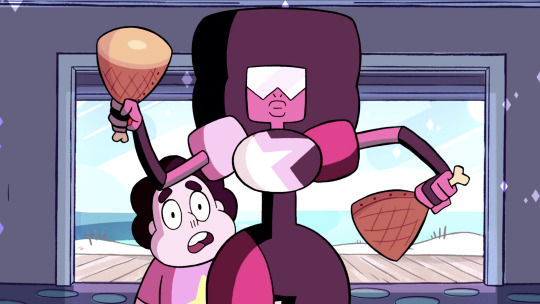
Okay, so... I just want to bring light to the fact that Garnet has literally been in this arcade ALL NIGHT LONG.
It was evening when she first arrived here- the sun was visibly setting in the background, and when Steven, Amethyst, and Pearl left, the sky was dark. But now it’s morning. Steven was just seen eating breakfast. And Garnet is STILL HERE.
Does this mean Mr. Smiley locked her IN? I have so many questions... Did he try to get her to leave, only to be intimidated by her complete lack of response? I would kill to know more about this interaction. Poor Mr. Smiley. That man deals with so much bullshit in this town, huh?
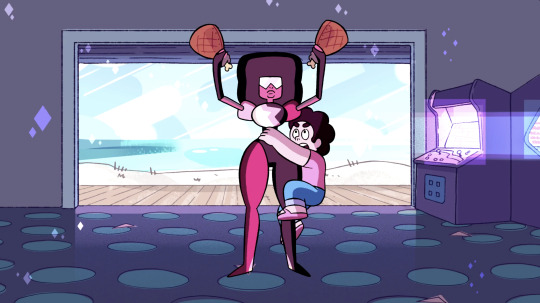
Geebus, is Garnet a solid wall. Previous episodes have shown Steven forcibly shoving whole tons of food, and swinging a mini-freezer over his head, and yet he can’t get her to budge even an inch.
I absolutely adore how he climbs up her frame like a koala, though, ahah. Cute.
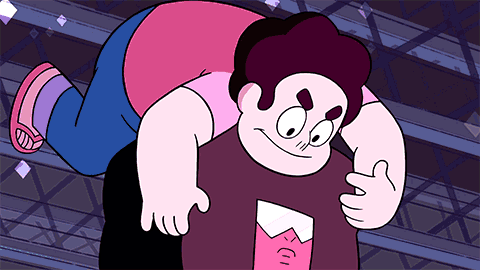
Meat Beat Mania announcer: “That’s rare!!”
Steven: “Oh my gosh...!”
I take these two lines as evidence that this is the first time Steven’s ever seen Garnet’s eyes. Specifically, the fact that there’s three of them. Which, makes sense- since Garnet is still really reserved emotionally at this point, and is only begins to get in the habit of taking her visor off to show Steven her full face later on in the show.
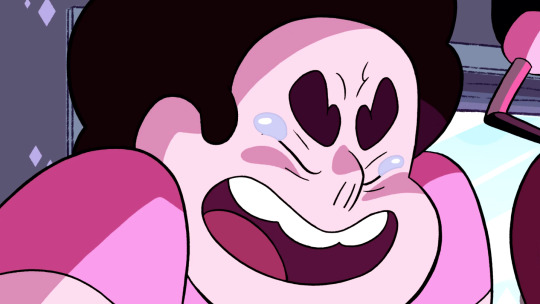
This expression deeply hurts me.
Steven’s so distraught here- because the others are in danger, the town is in danger, and he doesn’t have his trusty, dependable guardian who catches him when he falls and beats up scary monsters for him. Without her, the whole team is vulnerable and blind.
He feels alone. He feels... powerless.
And so he responds to that confusing, powerless feeling by trying to compensate with his own power. When all other routes he can think of fail, he smashes the video game console.
It... uh, it works... but once again, Steven entirely fails to consider the consequences, huh? He experienced a little bit of character growth in this regard in the episode Serious Steven, but even past that it’ll remain an recurring issue for him. Hell, his impulsiveness is a general character flaw even stretching into SUF.
In summary, though:
Poor Mr. Smiley. He works so hard, and doesn’t deserve this BS. ;-;
121 notes
·
View notes
Text
Why is Mary Crawford Mercenary?
Long post. We know that Mary is mercenary, she says, “A large income is the best recipe for happiness I ever heard of.” and she wishes several times during the book that Edmund was somehow richer (she wants Rushworth’s fortune to have gone to Edmund long before Tom looks like he might expire). She also was fully ready to marry Tom just because he’s the heir. But the real question is why is Mary mercenary and why is she attracted to Edmund in spite of herself?
When Mary comes to Mansfield, she says to her sister:
“In marriage especially. With all due respect to such of the present company as chance to be married, my dear Mrs. Grant, there is not one in a hundred of either sex who is not taken in when they marry. Look where I will, I see that it is so; and I feel that it must be so, when I consider that it is, of all transactions, the one in which people expect most from others, and are least honest themselves.”
“Ah! You have been in a bad school for matrimony, in Hill Street.” [Mrs. Grant]
“My poor aunt had certainly little cause to love the state; but, however, speaking from my own observation, it is a manoeuvring business. I know so many who have married in the full expectation and confidence of some one particular advantage in the connexion, or accomplishment, or good quality in the person, who have found themselves entirely deceived, and been obliged to put up with exactly the reverse. What is this but a take in?”
And then we hear her sentiments on the marriages of her friends, particularly Mrs. Fraser:
…I look upon the Frasers to be about as unhappy as most other married people. And yet it was a most desirable match for Janet at the time. We were all delighted. She could not do otherwise than accept him, for he was rich, and she had nothing; but he turns out ill-tempered and exigeant, and wants a young woman, a beautiful young woman of five-and-twenty, to be as steady as himself. And my friend does not manage him well; she does not seem to know how to make the best of it. There is a spirit of irritation which, to say nothing worse, is certainly very ill-bred… Poor Janet has been sadly taken in, and yet there was nothing improper on her side: she did not run into the match inconsiderately; there was no want of foresight.
We also hear about Mrs. Fraser from Edmund:
She is a cold-hearted, vain woman, who has married entirely from convenience, and though evidently unhappy in her marriage, places her disappointment not to faults of judgment, or temper, or disproportion of age, but to her being, after all, less affluent than many of her acquaintance, especially than her sister, Lady Stornaway, and is the determined supporter of everything mercenary and ambitious, provided it be only mercenary and ambitious enough.
And yet, Mary does truly love Edmund and for good reasons. She finds a charm, “in his sincerity, his steadiness, his integrity” And therein lies the cognitive dissonance: Mary knows that Edmund isn’t going to take her in. He’s honest. Mary is drawn to Edmund’s integrity, as she says to Fanny: “You all give me a feeling of being able to trust and confide in you, which in common intercourse one knows nothing of.”
So then why not just marry Edmund? Why not encourage him from the start? Mary can’t let go of what she has been taught, especially once she’s back in London. She can’t bear for her friends to know that she’s considering giving up town and living in the country with a clergyman. It’s below what she has always imagined for herself, even though what she never dared imagine is actually marrying a man of character who will not hurt her in the way she watched Admiral Crawford hurt his wife. She has witnessed a lot of bad marriages, she wants a good one for herself, but she also wants money and consequence. What she does not seem to grasp is that Edmund’s goodness might arise from him not being an heir. The three firstborn sons in Mansfield Park, to be blunt, kind of suck (Henry, Tom, and Rushworth).
This is why Mary has so much trouble marrying later, because she never learns this lesson. We hear at the end, “for Mary, though perfectly resolved against ever attaching herself to a younger brother again, was long in finding among the dashing representatives, or idle heir-apparents, who were at the command of her beauty, and her £20,000, any one who could satisfy the better taste she had acquired at Mansfield, whose character and manners could authorise a hope of the domestic happiness she had there learned to estimate, or put Edmund Bertram sufficiently out of her head.”
So to sum up, Mary is mercenary because she believes that people are deceptive, so she might as well just marry for money since she is guaranteed to be “taken in”. She realizes that Edmund is actually a good man, but she has trouble getting over her ambitions. She does resolve to accept him, but when she goes back to London she becomes hesitant again. She half-learns her lesson, and goes about trying to find a man of character among the rich.
Which leaves the question, would Mary have been happy if she married Edmund? I think that as the narrator hints, she would have adjusted to her life, “Experience might have hoped more for any young people so circumstanced, and impartiality would not have denied to Miss Crawford’s nature that participation of the general nature of women which would lead her to adopt the opinions of the man she loved and respected as her own.” and unlike her friends, she would have been truly happy, not just satisfied in greed.
#mary crawford#edmund bertram#mansfield park#jane austen#mercenry but redeemable#mary is so tragic to me#I wish she had gotten Edmund#at least she ended up with Mrs. Grant#I blame you for being an idiot Henry#Yes I know she wished Tom dead#I love her anyway#long post#many quotes
19 notes
·
View notes
Text
some writing tips (pt. one)
warning: this is a long post bc brevity isn’t one of my strong suits. also another disclaimer: these are just things i have learned/have worked for me. feel free to ignore them if they don’t help you!
1. the crossroads of plot and character
there will often come times when writing where the plot must move in a direction that the characters don’t want to follow. this usually results in characters being forced to act in ways that are not congruous with who they are, making them feel wooden or inconsistent to the reader.
one thing that has really helped me is some advice i heard from the writer’s of breaking bad. they said that one thing that really helped them was to ask “where is character x’s head at?”, or basically “what is my character thinking/feeling at this point in the story?”. it is almost always superior to have character drive plot instead of the other way around, so this question can help solve the issue of plot not gelling with character. i like to ask myself this question and reorganize the plot around my answer, and i have found it very useful for combatting content-based writer’s block.
2. rethinking character flaws
i have only recently learned how to better write character flaws, and i have found that they are huge for making a character feel real. whenever i used to think about flaws, i thought of them as huge, character-warping traits that basically defined an individual (example: prince zuko), but i always struggled to write them myself. lately, i have come view them as subtle beliefs or tendencies my character has that frames the way they interact with the world and others, and that has been massively helpful for me.
as sleazy as it is, i’m going to use my own writing as an example because i don’t read books anymore lmfao. anyhow, in my fic, “just practice”, annabeth has a tendency to be self-absorbed, which manifests in her assuming everyone thinks the way she does. nothing impressive, really. we see a few examples of it in action sprinkled throughout the story, and at first, it seems harmless, but the more we see of it, the more we realize what a huge issue it is in the context of the narrative as a whole. we see that it cripples the way that she communicates with others, how it has led her to hurting people she cares about because she assumed things about them, etc.
the fic is written from her perspective, so when she interacts with people, we can see that she genuinely doesn’t mean any harm. she just has a certain way of thinking. but in reality, the way that her flaw impacts others in the story becomes a huge source of conflict. it requires people to call her out and make her reflect on things. this is something that i think a lot of people can relate to. pretty much everyone acts with good intentions, but in reality they could be causing a lot of harm to those around them without meaning to.
i have found that using subtle flaws like this can be really helpful in making a believable character. i would suggest looking at people in your own life and their flaws as material you can use. most of them aren’t prince zuko - they have much subtler flaws about them that still have a huge role in who they are. once you have a flaw in mind for a character, it should inform their psychological make up, in either a minor or major way. i like to make this influence as subtle as i possibly can because that is what i personally find to be most realistic (note: by influence, i mean the way that the flaw manifests itself).
these flaws can be used to completely drive the plot depending on your genre. romance, young adult, literary fiction, etc. are all great candidates. for example, “catcher in the rye” is literally a plotless story about a teenage boy navigating his flaws.
here is some additional advice: show examples of the character’s flaws in action, first without drawing much attention to them, but with each new instance, crank up the impact of the flaw. this results in a natural escalation that flows really well with character development.
3. choices and consequences
foreshadowing is one of the most important tools a writer has to creating a satisfying narrative. in contrast, poor foreshadowing can ruin a narrative. nearly everyone can attest to how a deus ex machina or “subversion” completely derailed an otherwise good story (looking at your Game of Thrones Season 8). at the same time, foreshadowing is really hard to do well because of how much foresight it requires. outliners have the luxury of accounting for this before they write, but as a discovery writer, foreshadowing can feel impossible during your first draft.
that being said, i have personally found a work-around as a discovery writer for this exact problem, and that answer is to have narrative consequences. pretty much every plot point in your story should have consequences for the rest of the narrative going forward. this makes it a lot more easy for a discovery writer to write a better first draft - you just have to think about what how current plot point impacts the story going forward.
example: character gets into a foolish fight and loses their sword-fighting arm. now for the rest of the narrative, they can no longer rely on their prowess as a swordsman.
the neat thing about consequences is that you don’t have to plan ahead of time, but they still function similarly to foreshadowing.
4. foreshadowing proper
okay, but what about actual foreshadowing, you might ask. i think this is really hard to give concrete advice for, but here are some things that have helped me. i tend to have a lose idea of really major plot points that need to happen in my stories (example: the kara conversation in chapter seven of just practice). then, i try and think about how i can lay a trail of bread crumbs for that plot point to happen and reverse engineer my way there (example: chapter six, kara is mentioned by annabeth’s friends as having done something unforgivable to percy).
more specifically, i like to use character flaws as set up for plot points (this ties into the idea of consequences above). example: annabeth is increasingly frustrated by percy’s hiding secrets from her, stoking her already inquisitive nature to a boiling point, leading her to confront kara when she gets the opportunity, even though she knows she shouldn’t.
i primarily write drama/romance, so using character flaws as foreshadowing is my favored way of foreshadowing. i don’t think it translates as well for a mystery or a fantasy, but in those cases, laying bread crumbs still helps. in the harry potter books, rowling was often fond of burying important clues in irrelevant information. example: in book two, there is a brief mention of tom riddle’s diary in ginny’s cauldron when lucius malfoy slips it there at diagon alley.
another thing she does is to include information against the backdrop of another, more urgent plot point. example: in book four, harry tries to steal from professor snape for a task in the triwizard tournament or something, and snape accuses him of stealing ingredients to make polyjuice potion but it was barty crouch jr. who needed it to disguise himself as professor moody. you don’t pay much attention at the time because the tournament is more pressing.
#this took for fucking ever#please reblog this im actually begging#if it does well i will do more#i have tried to include examples but i barely read so big oof#i barely remember harry potter so dont murder me for getting plot points wrong#i bolded the important take aways as well#feel free to ask me questions if something was unclear
60 notes
·
View notes
Note
🔫 and 🌏 for everyone please?
Let's get into it! >:D
🔫 PISTOL - do they trust people easily? how easily will they turn their back to someone? have they been backstabbed before? will they betray someone if given an ultimatum?
A doesn't trust people very easily, but they are exceedingly kind and forgiving. It would take a lot, and I mean a lot to make them turn their back on someone. As far as backstabbing goes, they have gone through quite a few "death by a thousand cuts" kind of thing before, but that only makes them more determined not to betray anyone, even on pain of death.
Ailbhe's trust doesn't come easy, and neither does their forgiveness. Always concerned with what is morally right and the greater good, they hesitate to let themselves be swayed by emotion - whether that's towards clemency or vengeance. They would turn their back on someone if it were a consequence of doing the "just" thing, but it wouldn't sit easily on their conscience and they would always have regrets/self-doubt.
Catherine is quick to trust, albeit in small degrees and very...superficially. She may not let you see everything, but sharing little secrets adds a bit of fun to building relationships for her. True, deep trust is far harder to earn. She's far too slick to ever get caught in a situation where she'd be stabbed in the back. In Catherine's eyes, they've never betrayed anyone...certain others might beg to differ.
Imric's trust is similar to Catherine's in that he likes having many casual, friendly relationships, but few people can say they truly know him inside and out. He's had his share of getting skinned, but getting him to completely turn his back on someone would take a lot. He might come off a bit callous because he plays a little fast and loose with what exactly constitutes a bit of ribbing vs unforgivable throwing under the bus, but Imric generally has other people's wellbeing at heart.
Mina doesn't trust easy, but when she does, she'll go to the ends of the earth and run herself ragged for someone who's managed to earn that special status. She's skilled at slipping out of potential traps/betrayals before the noose can tighten, her foresight kept sharp by the perils of her occupation, though that skill was hard-won. She would not betray anyone unless she thought the betrayal would end up being better for their safety or the only way she could assure it.
Rosalind is firmly in the "trustworthy until proven otherwise" camp, but only with her own secrets. She hasn't suffered much backstabbing (aside from a few childhood incidents involving Christmas pudding), but betrayal is an unthinkable offense for her. No matter the stakes, she wouldn't do it.
Sam wants to trust rather than suspect, but he's been burned too many times and his heart has been hardened. Wary until someone has proven that they won't slip a blade between his shoulders, Sam generally keeps everyone at a distance - he thinks it's for his safety if they have bad intentions, and for their own otherwise (poor guy has seen a childhood friend ostracized and abused for associating with him. no he is not okay). Given an ultimatum, Sam would refuse to betray someone (he knows how deeply that cuts) unless the price to be paid involves the suffering of one of his family members. And if he chose to betray, that choice would haunt him forever.
🌏 EARTH - will they give up the world for someone they love? is this decision easy for them?
I took this as "sacrificing the world" à la Life is Strange, either to save the loved one or at the loved one's behest.
A - Yes. They would refuse to choose at first and try to save both, but ultimately A would give up the world for someone they love. The decision would tear them apart, but they'd stand by it.
Ailbhe - are you trying to break them? Because this is how you break them. It would be torture, but Ailbhe would not give up the world for a loved one. The decision would haunt them every day and they'd always blame themself for not being able to find a way to save everyone.
Catherine - Catherine would sacrifice the world in a heartbeat for someone she truly loved. What's that quote about burning down the world for a last kiss goodbye?
Imric - "But...you are my world. 🥺😏😉" This is Imric's worst nightmare. He would talk to his loved one and really try to get from them what they would do if they were in his place. No matter the answer, he'd give that loved one the best possible week before the Decision had Consequences. (You know that Teen Titans episode where Raven treats all her friends to the best day ever because she knows it's the last day before the apocalypse? Yeah, very that.)
Mina - Mina would pull the trigger and give up the world, and she'd force herself to keep her eyes open the whole time. A tiny part of her might regret her choice later - not because she thinks she should have sacrificed her loved one instead, but because she won't be able to stop thinking about the lives she was responsible for and the stories she ended.
Rosalind - She thinks she would give up the world for someone she loves, but when it comes down to it, she wouldn't be able to pull the trigger. It'd be a very tearful and distraught decision-making process, not to mention the realization.
Sam - He would give up the world, but make sure he was the one taking the shot. He'd want the responsibility on his shoulders alone, and even if the guilt destroyed him, he'd rather be tortured by it if it meant his loved one could be happy.
#h&h#h&h ask#ask#thank you for the ask anon!#H&H:A#H&H:Ailbhe#H&H:Catherine#H&H:Imric#H&H:Mina#H&H:Rosalind#H&H:Sam
10 notes
·
View notes
Text
One of the most striking themes throughout the series but especially this season has to be the lack of effective financial literacy education provided to low-income families or those living in poverty. There are classes on how to manage personal finances in public schools, but their scope is limited. They don’t fully prepare a person for investment opportunities, calculating cost-effective vehicle pricing, or the various complex facets of homeownership. Much of the time, those are skills that our parents teach us or help us with when we’re actually in a situation where that discussion is relevant, but we take for granted that it’s a uniquely middle-class trend. The very wealthy tend to have advisors, and the very poor are often and understandably more focused on passing down monetary survival skills than knowledge they don’t have access to on how to get ahead. (Of course, this is a generalization. This won’t be the case for every lower class family, and there are various levels of the lower class that will impact this determination, but with the Gallaghers living in poverty for much of their lives and the nature of their parentage, it stands to reason that this has been their experience.)
We’ve seen the Gallaghers nearly lose the house on numerous occasions without recourse, sliding by with a bit of luck and a lot of scamming. Cousin Patrick could swoop in and yank the rug out from beneath them because they had less foresight than he did about filing a will immediately and the consequences of pretending that a family member had died with regards to others stepping forward to claim their assets. He then evicted them when the property values in the neighborhood were on the rise due to gentrification, which they didn’t see coming and didn’t consider renegotiating the terms of their rent over as a result.
Now, it’s a pervasive element this season. Lip has always been intelligent and could once rattle off all the useless facts he’d ever read. They were frequently related to scams, though, or meant to be used in an argument so that he could undermine the other side’s points. He had no reason to consider signing a lease because in their neighborhood, in an environment where everyone is living in poverty and sticks together to get by, a handshake should have been enough. A handshake probably would have been enough if this were the South Side of s1-4. It isn’t, though. This South Side is rapidly being appropriated by middle-class and wealthy families that see it as an investment opportunity, which means that as the low-income families move out, there’s no one left to shake hands with. You need an understanding of leases, rental agreements, tenant and homeowner relationships, and what your legal rights are as the tenant. Lip doesn’t have that. He wasn’t taught, and he never had a reason to learn. Tami, being from the middle class, does know it and can’t believe that he doesn’t due to this class divide.
Debbie is going through the same right now. While she’s reluctantly agreed to sell, she doesn’t actually have to. Fiona’s name is on the house, but Carl’s money was used to make the purchase. The house was purchased for the entire family, even if he initially wanted it to be his. If Debbie recognized the financial options available to her, she might suggest to Lip that they go to an assessor, get an appraisal for the house, divide the total into fifths, and she can buy him out of his portion. He still gets the amount of money he wants, and she gets to keep the house. Ian and Mickey were going to move out without needing a share once they had the cash stored up, but if they wanted a share, she could also take out a loan to buy them out, especially if Carl co-signed because of his income. Lip said she makes good money with owning her own business, and aside from her truck (which may or may not be paid off), she has no debt or bills beyond utilities. She doesn’t suggest that, though, because she’s likely not aware of it. There’s no reason she should be. Like Lip, Frank and Monica didn’t teach her, and neither did her formal education.
It continues to amaze me how much I find when I sit and think on this show. This is an understated commentary that you really need to know what you’re looking at to recognize. In the end, it doesn’t matter how smart you are or what your grades were in school or if you were college material. Class influences our opportunities, and while the Gallaghers are not exactly living in poverty anymore, their options are limited to what they know from experience. In the homeownership sphere, those limitations are once again rearing their heads this season.
#shameless#shameless spoilers#shameless meta#just some thoughts that hit me because why not#and please don’t add tags about writer intent or whatever#I’m analyzing the text not the creators
57 notes
·
View notes
Text
3rd May 1128: Kelso Abbey Consecrated

Although King David I was perhaps not as saintly as contemporary chroniclers would have us believe, he certainly founded a lot of monasteries. Setting aside his rather subjective view of what constituted barbarity, John of Hexham’s description of the king’s outward piety is quite revealing:
“There has been none like unto that prince in our days: devoted to divine services, failing not to attend each day at the canonical hours, and also at the vigils of the dead. And in this he was to be praised that in a spirit of foresight and courage he wisely tempered the fierceness of his barbarous nation; that he was frequent in washing the feet of the poor, and compassionate in feeding and clothing them; that he built and supplied sufficiently with lands and revenues the monasteries of Kelso, Melrose, Newbattle, Holmcultram*, Jedburgh, Holyrood- these being situated to this side of the sea of Scotland**, besides those which he benefited in Scotland***, and in other places.”
This list of abbeys patronised by David in Lothian and Cumbria alone reflects the king’s particular spiritual interests. Three of these abbeys (Melrose, Newbattle, and Holmcultram) were staffed by Cistercian monks, and two (Jedburgh and Holyrood) by Augustinian canons regular. These orders were especially favoured by David, and multiple Cistercian and Augustinian houses sprang up north of the Forth as well after he succeeded to the Scottish throne in 1124. But the king also patronised a range of other religious organisations, and his royal descendants and the Scottish nobility soon followed his lead. By the end of the thirteenth century, Scotland was home to an eclectic mix of Cluniac, Tironensian, Culdee, and Valliscaulian monasteries, as well as houses belonging to Premonstratensian canons, and the Knights Templar and Hospitaller, and various Dominican, Franciscan, Carmelite, and Trinitarian friaries. David’s first known foundation reflected this wide-ranging religious interest. In 1113, he settled Tironensian monks on his lands at Selkirk, now the site of a well-known Borders town. This small beginning would have important consequences for the spread of reformed monasticism in Scotland and the overall shape of the mediaeval Scottish Church...

(The abbey of Tiron, the French motherhouse of the Tironensian order. David I visited the abbey himself and the first monks at Selkirk came from there. Source - wikimedia commons where the user Calips has kindly made this image available for reuse under a creative commons license)
David’s project at Selkirk reflected the spiritual trends of the age. The early twelfth century witnessed the blossoming of another Benedictine reform movement, with various new monastic orders popping up all over western Europe (but especially in France). These attracted many people who sought to return to a purer and stricter form of conventual life and who felt that observance of the monastic “rule” of St Benedict had grown too lax, especially in the great abbeys of the day. Citeaux, the motherhouse of the influential Cistercian order which was founded in a marshy wood by Robert of Molesme in 1098, was only the most famously successful example. Another slightly less popular but nonetheless influential foundation was the abbey of Tiron, which is supposed to have been founded by the hermit Bernard of Abbeville in a “wooded place” near Chartres around the year 1109. Tiron was granted its official foundation charter in 1114, and by the 1120s the new order had over a hundred daughter houses, especially in France, Britain, and Ireland.
One of the earliest examples in Britain was the priory of St Dogmaels in Pembrokeshire, which was founded around 1113 and became an abbey a few years later. However apart from that house’s own two daughter houses (Pill Priory and Calder Priory) the Tironensians did not spread much further in Wales, at least not in comparison with the number of traditional Benedictine and Cistercian houses. In England the Tironensian order was represented by only a handful of priories, founded mostly in the first half of the twelfth century, and one abbey at Humberston in Lincolnshire, founded in 1160. Meanwhile Ireland’s sole Tironensian house- Glascarrig Priory in County Wexford – was again a daughter house of St Dogmaels. In Scotland, by contrast, the congregation of Tiron would become extremely influential, both within and outwith the cloister. The “grey monks”, as they came to be known, had arrived by at least 1113, which is when the Chronicle of Melrose claims that David founded a community at Selkirk. The abbey which these monks established, dedicated to St Mary and St John the Evangelist, received its formal foundation charter from David c.1119-20. This also came with a substantial endowment in lands and possessions and the charter was witnessed by many important members of the prince’s inner circle, including his wife Maud, their young son Henry, and David’s former chaplain John, now bishop of Glasgow.

(St Dogmael’s Abbey in Wales, another early Tironensian foundation in Britain. Source: Wikimedia Commons, where user Stephen McKay has kindly made this available for reuse under a creative commons license)
From the beginning, the monks of Selkirk were evidently at the centre of David’s spiritual and political plans. However it is less clear why he singled out the Tironensian order as the beneficiary of his patronage. His choice might have been influenced by his chaplain John, who remained close to David even after his elevation to the see of Glasgow, and who was himself a monk of Tiron (he later attempted to retire to the French motherhouse of the order during the 1130s). Like much of his career, David’s decision to found a Tironensian house may also have been influenced by his relationship with his sister Matilda and her husband Henry I of England. Although neither had a particular interest in the Tironensians, David’s political association with Henry in the years before he ascended the Scottish throne provided him with some of the tools to indulge his own interest in the order. It was with the English king’s support that David secured possession of substantial lands in the south of the kingdom of Scotland, despite his older brother Alexander I’s opposition. His relationship with Henry I also created ties between the future king of Scots and northern France. David not only held lands from the English king around Cherbourg in Normandy, but he was also in touch with affairs in other parts of France, and he is known to have visited the abbey of Tiron in person on at least one occasion before 1114. Although the source of his particular interest in the Tironensians must remain unclear, David plainly found the spiritual ideals and organisation of the fledgling order impressive enough that his earliest recorded action as “Prince of the Cumbrians” was to invite the monks of Tiron to settle on his new lands in southern Scotland.
The new community at Selkirk was apparently quite successful in its early years. Despite the distance between Lothian and the forests of Perche, the monks there retained close links with the motherhouse. The first two abbots of Selkirk succeeded in turn as heads of the order and abbots of Tiron. The monks rose high in the Scottish church too, as the third and fourth abbots of Selkirk succeeded as bishop of Glasgow and bishop of St Andrews respectively. By this time however, it had become clear that the original home of the monks beside the Ettrick water was unsuitable. Within fifteen years of the original foundation, plans were afoot to move the whole community around twenty miles downstream to Kelso, where the River Teviot joins the Tweed.
The new site may have been selected because of its proximity to the royal castle and burgh of Roxburgh, which David had been developing as a political, economic, and administrative centre. After he succeeded his older brother Alexander as King of Scots in 1124, Roxburgh also became one of the most important royal residences in the realm, and it made sense to have the new king’s favoured monastery near at hand. Accordingly, the decision was taken to transfer the abbey to Kelso, although this was to be a gradual process, with the building work and relocation of the monks taking at least two years. Eventually, when the move was largely complete, the abbey church of St Mary and St John the Evangelist was officially consecrated on 3rd May 1128, an event which was probably attended by the king and his leading nobles.
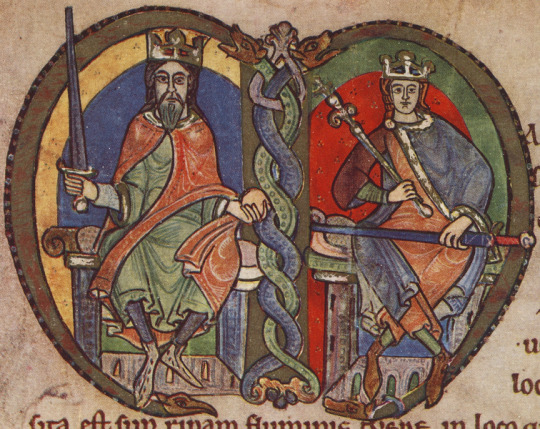
(A twelfth century portrayal of David I and his grandson Malcolm IV in the historiated initial of a charter granted to the abbey of Kelso. Source- wikimedia commons)
Kelso abbey was to become one of the richest abbeys in the kingdom and by the end of the century it had acquired several daughter houses, including the abbeys of Arbroath, Kilwinning, and Lindores. The grey monks could be very influential figures: it has already been noted that Herbert, the abbot who oversaw the move from Selkirk to Kelso was destined to succeed to the see of Glasgow, while his successor Arnold rose to the position of bishop of St Andrews. Another (though much later) influential Tironensian was Bernard, who was first abbot of Kilwinning, then abbot of Arbroath, and then bishop of the Isles and chancellor to King Robert I. And even after David I turned to other reformed orders like the Cistercians to further his spiritual policies, Kelso abbey retained its close links with the royal family. David’s only son and heir, Prince Henry, was buried at the abbey after his untimely death in 1152. One of the abbey’s charters, granted by Henry’s son Malcolm IV a few years later, preserves the only surviving contemporary picture of Malcolm and his grandfather David, who are portrayed in a style reminiscent of the biblical Solomon and David in the historiated capital ‘M’.
Like many other Border abbeys Kelso suffered heavily during the bitter Anglo-Scottish warfare which broke out after 1296. Nonetheless it remained an important and wealthy establishment, the abbacy of which sixteenth century kings and nobles often sought to secure as a commend for their younger or illegitimate kinsmen. In 1460, Kelso even witnessed a coronation when the eight-year-old James III was crowned king of Scots in the presence of his mother and the leading nobles of the realm, following the death of his father during the siege of nearby Roxburgh Castle. The abbey outlasted this castle by at least a century, but not much more. Having already suffered considerably from English attacks during the “Rough Wooing” of the 1540s, Kelso abbey was officially dissolved after the Protestant Reformation in 1560. Much of the abbey was gradually dismantled over the next three centuries. Though the burgh which grew up around the monastery is still thriving today, the building itself is much reduced, with only the central part of the abbey church remaining above ground. The fine Romanesque architecture of these ruins suggests that they formed part of the original church consecrated in 1128. Almost nine hundred years old, the ruined church stands today as a memorial to the former grandeur, wealth, and influence of the Tironensian order in Scotland.
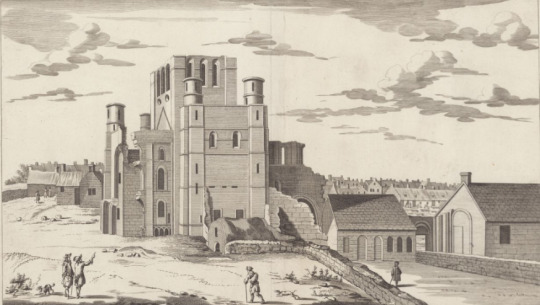
(A seventeenth century depiction of the ruined abbey of Kelso, made by John Slezer. Reproduced under the terms of the Creative Commons Attribution licence, with the permission of the National Libraries of Scotland)
Notes:
* It is actually unclear whether David founded Holmcultram or was simply a patron of the monastery. Of the monasteries on John of Hexham’s list, this is also the only one which does not lie within the borders of 21st century Scotland.
** The “Scottish sea” usually meant the Firth of Forth in the Middle Ages.
*** When John of Hexham says that David also patronised monasteries “in Scotland” he probably means Scotia ‘proper’, i.e. the land north of the Forth, as opposed to Lothian, which is where Kelso, Melrose, Newbattle, Jedburgh, and Holyrood lay in the twelfth century.
Selected Bibliography:
- “Chronicle of Melrose”, as translated in “The Church Historians of England”, vol.4, edited by Joseph Stevenson
- “Early Sources of Scottish History”, edited by A.O. Anderson
- “Scottish Annals from English Chroniclers”, edited by A.O. Anderson
- “Liber S. Marie de Calchou: Registrum Cartarum Abbacie Tironensis de Kelso, 1113-1567″, edited by Cosmo Innes
- “The Charters of King David I”, edited by G.W.S. Barrow
- “The Monks of Tiron”, K. Thompson
- “Kingship and Unity, Scotland 1000-1306″, by G.W.S. Barrow
- “David I”, by Richard Oram
#Scottish history#British history#Scotland#mediaeval#Scottish borders#THE BORDERS#Kelso#Roxburghshire#Kelso Abbey#Selkirk#monastery#abbey#Christianity#Religion#Catholicism#Kirk and people#Tironensian#David I#House of Canmore#monasticism#monasteries#clergy#buildings#places to go#historical events#twelfth century#1120s#1110s#reformed monasticism
21 notes
·
View notes